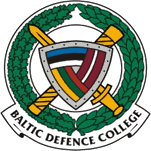 Emblem | |
| Motto | Ad securitatem patriarum (Latin: For the fatherlands’ security) |
|---|---|
| Type | Military college |
| Established | 25 February 1999 |
Academic staff | Approx. 50[ citation needed ] |
| Students | Approx. 80[ citation needed ] |
| Location | , 58°22′24″N26°43′21″E / 58.37333°N 26.72250°E |
| Affiliations | ISMS; IAMP |
| Website | www |
The Baltic Defence College (BALTDEFCOL) is a multinational military college that was established by the three Baltic states (Estonia, Latvia and Lithuania) in 1999. It serves as a centre of strategic and operational research and provides professional military education to intermediate- and senior-level officers and government officials from the founding states, other member states of the European Union (EU) and the North Atlantic Treaty Organization (NATO) countries, as well as other European countries including Armenia, Azerbaijan, Bosnia and Herzegovina, Georgia, Moldova, Montenegro, Serbia and Ukraine. [1]
